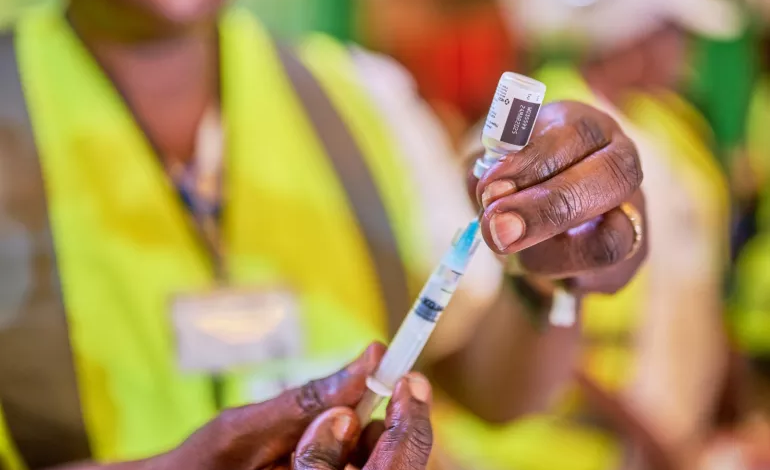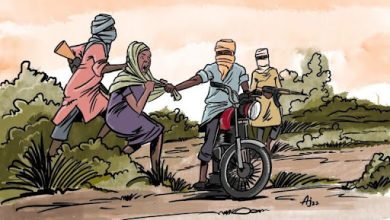No, HPV Vaccine Won’t Make You Infertile. Here Are Other Things You Should Know.
The introduction of the free dosage of the vaccine to help prevent the infection of HPV-related diseases has been followed by a deluge of misinformation, leading to hesitancy. Here, we separate the facts from fake news.

Thousands of people lose their lives to cervical cancer every year in Nigeria. Now, thanks to the free Human Papillomavirus (HPV) vaccine, many women can breathe a sigh of relief. The shot can prevent several types of cancer, but there’s still some confusion out there.
Since the introduction of the free dosage of the HPV vaccine in Nigeria to help prevent the infection of HPV-related diseases that affect both men and women — such as cervical, penile, anal, and respiratory diseases, it has been followed by a deluge of misinformation and misconceptions, leading to the hesitancy of some people to take the vaccine.
The government says it targets 7.7 million girls for the free dosage, and Kano, the most populated state in the country as of the last census, says it targets 1.5 million girls between the ages of 9 and 14. The vaccination programme has been going on since October at different primary healthcare centres across the country. However, the spread of misconceptions related to the vaccine is preventing many people from benefitting from the programme — similar to what was seen during the COVID-19 vaccination.
The claims include that the West is using the HPV vaccine to reduce the population of Africa, that the vaccine is a way to inject HIV into the bodies of young girls so that they could die in the future, and that Nigerian leaders have been sponsored to give up their country to their enemies.
These claims have been shared on different social media platforms, especially WhatsApp in northern Nigeria, where audio recordings in Hausa are forwarded widely to individuals and groups, causing mass confusion and instilling fears.
Three such recordings were recently made by one man and two women. “It’s not just about birth control, as it will hardly affect any person who takes baobab leaf stew,” the unidentified man claimed. “It’s about injecting young girls with HIV so that they will just be dying as they grow up.”
He later said that they have been calling people at different levels to never allow their children to be vaccinated, whether in homes, schools or even at primary healthcare centres.
One of the two women in the other recording expressed concern about how fast the vaccination programme was going. “The vaccine has already been going into states like Kebbi, Sokoto, and Zamfara,” she said. “We will not forgive our leaders, from the ward chief to the governor, who refused to investigate this vaccine because they are all after money.”
Another woman, who appeared to be responding to someone else, claimed that young and teenage girls had been targeted with the vaccine so that they could be given permanent birth control.
“If you search on the Internet, you will see that married women who are sexually active are the ones who are prone to cervical cancer,” she said. “If that’s the case, then why are young girls who are not sexually active being given the vaccine?”
Verification
There’s no evidence to support the claim that the HPV vaccine was introduced to control the population in Nigeria. This is a common myth spread in relation to most other vaccines introduced in the country. The polio and COVID vaccines were also accused of causing infertility, but many of those who took the shot have given birth and continued to be fertile.
According to the World Health Organisation (WHO), since 2012, individual case reports have linked vaccination against HPV with primary ovarian insufficiency (POI), defined as dysfunction or depletion of ovarian follicles, menopausal symptoms, and reduced fertility before the age of 40. However, in 2019, after analysing the reports and conducting research, WHO concluded that “the available data do not support an association between HPV vaccination and infertility”.
While the speaker in the first audio claimed that taking baobab leaf soup works against any birth control pill, there is no evidence that this claim is true, as millions of people have been taking the soup and getting the pill to work for them. Scientific studies on baobab have indicated that the fruit is good for pregnant and fertile women, but there is no scientific study that says taking baobab leaves works against birth control pills.
According to Dr. Ahmad Tijjani Ibrahim, the Chief Medical Director (CMD) at Babura General Hospital, birth control injections or pills don’t have effect beyond three months.
“All the fertility drugs are injectable hormones that are slowly cleared off the body via urine,” Dr. Ibrahim told HumAngle. “Longest injectable hormones for birth control last for 3 months,” he explained, saying that the claim the vaccination can cause infertility or birth control is baseless and medically false.
His claim that the HPV vaccine is also meant to inject HIV into children’s bodies is also unfounded. The vaccine was found to be safe and useful even for people infected with HIV.
Debunking the claim, Dr. Ibrahim said it’s impossible to inject someone with HIV as “HIV becomes inactive 30 minutes outside the bloodstream and once inactive it can’t become active again.” He explained that the environmental temperature and other effects will naturally kill the effect of the HIV even if assumed it’s in the vaccine even though “there’s no slightest evidence” for that.
The vaccine has also been approved by WHO and the National Agency for Food and Drug Administration and Control (NAFDAC) for use in Nigeria. The vaccine does not cause any harm or disease to the body.
Both the NCDC and WHO have certified the HPV vaccine as safe. It has been tested not only in Nigeria but in many other countries across the world. People in countries such as the United States, Brazil, and China have all received the vaccine.
The claim that only sexually active women are prone to cervical cancer is also not true. According to Nigeria Health Watch, while sexual contact is the most common mode of transmission, it is not the only way to contract HPV. Therefore, it’s important to get the vaccine to reduce the risk of infection, especially for individuals who are not sexually active.
Misconceptions about the vaccine
Amidst efforts to promote vaccination in Nigeria, a host of misconceptions have arisen, often fueled by false claims and unfounded fears.
The HPV vaccine causes infertility in girls:
Multiple scientific studies have shown no evidence that the HPV vaccine causes infertility. The vaccine is designed to prevent cervical cancer by targeting specific strains of the human papillomavirus, and extensive research supports its safety.
The HPV vaccine is not necessary because cervical cancer is rare in Nigeria:
According to the United Nations, cervical cancer is the third most common cancer in Nigeria and the second most frequent cause of cancer deaths in the country among women between the ages of 14 and 44. In 2020, data collected showed 12,000 recorded cases and 8,000 deaths from cervical cancer.
While cervical cancer incidence may be lower in Nigeria compared to some other countries in Africa, such as Malawi and Mozambique, it remains a significant health concern. Health authorities all over the world recommend the HPV vaccine as a preventive measure to lower the risk of cervical cancer, but its advantages go beyond just preventing this particular cancer.
The HPV vaccine is only for girls:
According to Nigeria Health Watch in a document seen by HumAngle, the HPV vaccine is beneficial for both boys and girls. It helps protect against various cancers caused by HPV, including cervical, anal, penile, and oropharyngeal cancers. Immunising both genders contributes to broader community immunity and reduces overall HPV transmission.
However, the vaccination programme currently ongoing in Nigeria targets only girls between the ages of 9 and 14 because they’re more prone to cervical cancer. The ages are within the range of girls who are expected to start having sex within a few years. The vaccination targets them so that when they start having sex, it will prevent them from contracting cervical cancer.
The HPV vaccine has caused the deaths of those it was administered:
The vaccine is safe and does not contribute to any serious health issues. Like any vaccine or medicine, the vaccine may cause little reactions such as pain or redness in the arm where the shot is given, dizziness, fainting, nausea, and headache, all of which are temporary.
On very rare occasions, a person may have a serious allergic reaction (anaphylaxis) to any vaccine, including HPV vaccines. In the United States, it was found that only three people in a million experience such allergic reactions. In Nigeria, such cases have not yet been reported.
Natural remedies are more effective than the HPV vaccine:
While maintaining overall health is important, natural remedies alone are not a substitute for the vaccine. Scientific studies consistently demonstrate the vaccine’s effectiveness in preventing HPV-related cancers. Relying solely on natural remedies can leave individuals vulnerable to HPV infections and associated health risks. This doesn’t mean natural remedies don’t work, but they are not a substitute. It’s better to get the vaccine to prevent the infection than to think of curing it using any type of unproven medicine.
The vaccine is too expensive for the average Nigerian family:
The HPV vaccine is available at no cost through public health programmes in many parts of Nigeria. The vaccination programme targets 7.7 million girls in Nigeria, and efforts are being made to increase access and affordability. Moreover, the long-term benefits of preventing HPV-related cancers make the vaccine a cost-effective investment in public health.
Support Our Journalism
There are millions of ordinary people affected by conflict in Africa whose stories are missing in the mainstream media. HumAngle is determined to tell those challenging and under-reported stories, hoping that the people impacted by these conflicts will find the safety and security they deserve.
To ensure that we continue to provide public service coverage, we have a small favour to ask you. We want you to be part of our journalistic endeavour by contributing a token to us.
Your donation will further promote a robust, free, and independent media.
Donate HereStay Closer To The Stories That Matter




